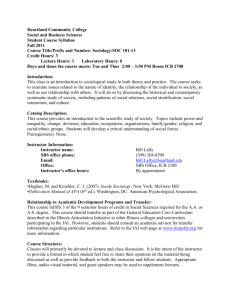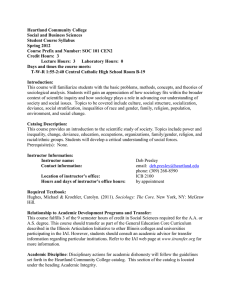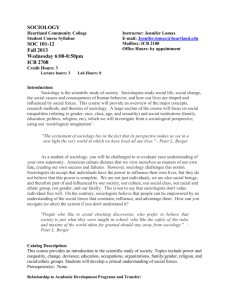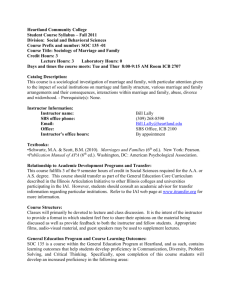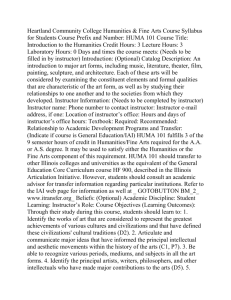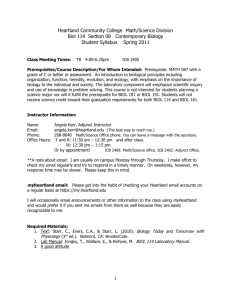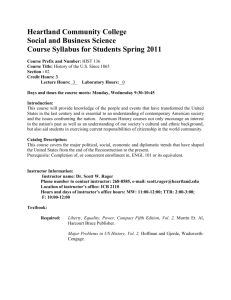SOC 101 CPE LALLY SP 12 - Heartland Community College
advertisement
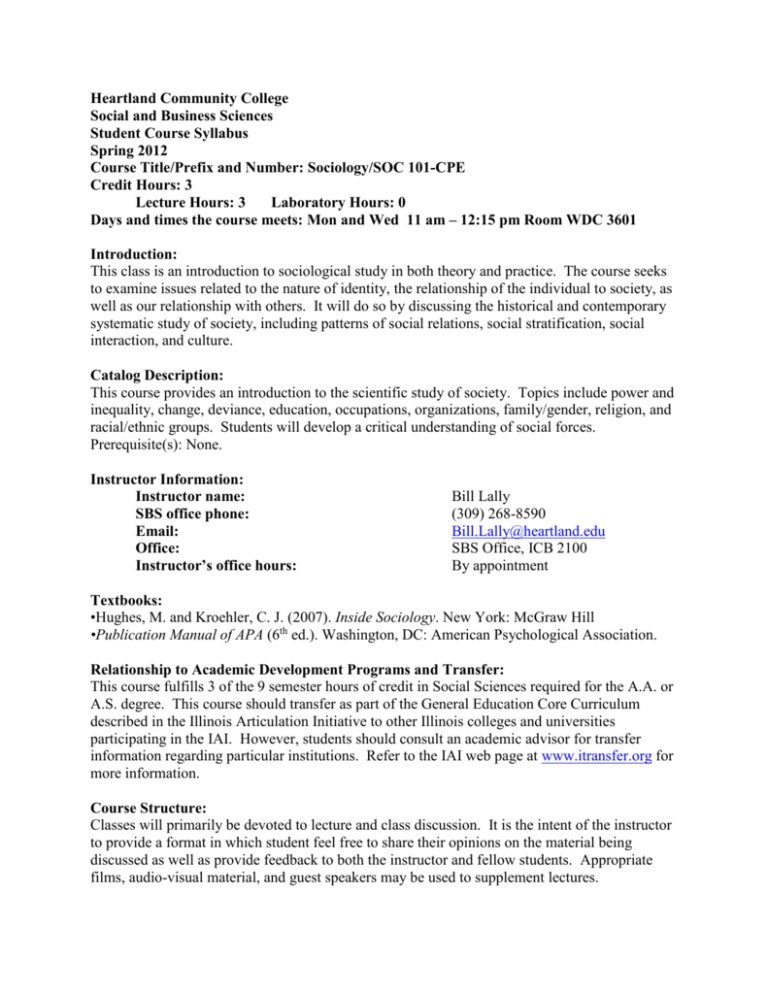
Heartland Community College Social and Business Sciences Student Course Syllabus Spring 2012 Course Title/Prefix and Number: Sociology/SOC 101-CPE Credit Hours: 3 Lecture Hours: 3 Laboratory Hours: 0 Days and times the course meets: Mon and Wed 11 am – 12:15 pm Room WDC 3601 Introduction: This class is an introduction to sociological study in both theory and practice. The course seeks to examine issues related to the nature of identity, the relationship of the individual to society, as well as our relationship with others. It will do so by discussing the historical and contemporary systematic study of society, including patterns of social relations, social stratification, social interaction, and culture. Catalog Description: This course provides an introduction to the scientific study of society. Topics include power and inequality, change, deviance, education, occupations, organizations, family/gender, religion, and racial/ethnic groups. Students will develop a critical understanding of social forces. Prerequisite(s): None. Instructor Information: Instructor name: SBS office phone: Email: Office: Instructor’s office hours: Bill Lally (309) 268-8590 Bill.Lally@heartland.edu SBS Office, ICB 2100 By appointment Textbooks: •Hughes, M. and Kroehler, C. J. (2007). Inside Sociology. New York: McGraw Hill •Publication Manual of APA (6th ed.). Washington, DC: American Psychological Association. Relationship to Academic Development Programs and Transfer: This course fulfills 3 of the 9 semester hours of credit in Social Sciences required for the A.A. or A.S. degree. This course should transfer as part of the General Education Core Curriculum described in the Illinois Articulation Initiative to other Illinois colleges and universities participating in the IAI. However, students should consult an academic advisor for transfer information regarding particular institutions. Refer to the IAI web page at www.itransfer.org for more information. Course Structure: Classes will primarily be devoted to lecture and class discussion. It is the intent of the instructor to provide a format in which student feel free to share their opinions on the material being discussed as well as provide feedback to both the instructor and fellow students. Appropriate films, audio-visual material, and guest speakers may be used to supplement lectures. Course Objectives (Learning Outcomes): At the completion of this course, the student will be able to accomplish the following objectives. CATEGORY Problem Solving Communication Diversity Critical Thinking Course Specific CLASS OUTCOMES Demonstrate awareness and understanding of the science and research methods developed in sociology. Apply the basic sociological paradigms 1. Structural functional 2. Social conflict 3. Symbolic interaction Define, give examples, and demonstrate the relevance of the following sociological notions: culture, socialization, stratification, social structure and social change. Analyze the functions and dysfunctions in the major social institutions such as family, government, economy, religion, education, and medicine. Identify and offer explanations of social inequality while considering the relationship to social process, social interaction and institutions. Examine and explain the impact of human relations on patterns of urbanization and the physical environment. Analyze and demonstrate awareness of the impact of cultural diversity in our society. Course/Lab Outline: 1. Developing a Sociological Consciousness 2. Culture and Socialization 3. Social Structure, Groups and Organizations 4. Deviance and Crime 5. Social Stratification 6. Inequalities of Race, Ethnicity and Gender 7. The Family 8. Social Institutions 9. Population and Environment 10. Social Change Blackboard Current grades, class announcements, writing examples and assignments, as well as other support material are available for this class on Blackboard. Method of Evaluation (Tests/Exams, Grading Systems): Students should have assigned readings completed before corresponding lectures. EXAMS - There will be three exams given covering readings, lectures and other related course materials presented during that corresponding period. In other words, they are not cumulative. QUIZZES - Periodic quizzes will be administered covering that weeks assigned readings. WRITING ASSIGNMENTS - There will be one (3-4 pages) writing assignment due throughout the semester. TERM PAPER - A 5-6 page paper covering a sociologically related topic will be due at the end of the semester. A more detailed handout explaining the assignment requirements will be passed out. NOTE: Make-ups will not be given for missed exams or quizzes. However, the lowest quiz grade will be dropped. In addition, papers are due at the beginning of class. Late assignments will be penalized and will only be accepted if the student has spoken with the instructor before the due date. E-mailed papers will not be accepted. Percentage 90 - 100 80 - 89 70 - 79 60 - 69 59 or less Letter Grade A B C D F CATEGORY Quizzes Exam 1 Exam 2 Exam 3 Writing Assignments Term Paper TOTAL PERCENT 10% 15% 15% 15% 20% 25% 100% Classroom Attendance: Attendance is strongly encouraged. To promote attendance pop quizzes will be given throughout the semester. NOTE: I do not email PowerPoints. If you miss a class it is your responsibility to get the notes from a fellow student. Classroom Behavior: All cell phones should be either turned off or placed on vibrate during class. Please direct all discussion towards classroom participation. Disruptive students may be removed from class. Academic Integrity and Plagiarism: Academic Integrity Academic integrity is a fundamental principal of collegial life at Heartland Community College and is essential to the credibility of the College’s educational programs. Moreover, because grading may be competitive, students who misrepresent their academic work violate the right of their fellow students. The College, therefore, views any act of academic dishonesty as a serious offense requiring disciplinary measures, including course failure, suspension, and even expulsion from the College. In addition, an act of academic dishonesty may have unforeseen effects far beyond any officially imposed penalties. Violations of academic integrity include, but are not limited to cheating, aiding or suborning cheating or other acts of academic dishonesty, plagiarism, misrepresentation of data, falsification of academic records or documents and unauthorized access to computerized academic or administrative records or systems. Definitions of these violations may be found in the college catalog. Plagiarism Plagiarism is the presenting of others’ ideas as if they were your own. When you write a paper, create a project, do a presentation or create anything original, it is assumed that all the work, except for that which is attributed to another author or creator, is your own. Plagiarism is considered a serious academic offense and may take the following forms: 1. Copying word-for-word from another source and not giving that source credit. 2. Paraphrasing the work of another and not giving that source credit. 3. Adopting a particularly apt phrase as your own. 4. Using an image or a copy of an image without crediting its sources. 5. Paraphrasing someone else’s line of thinking in the development of a topic as if it were your own. 6. Receiving excessive help from a friend or elsewhere, or using another project as if it were your own. Academic Support Services (Academic Support Center) www.hcc.cc.il.us/divisions/asc Heartland Library Information The library, located in the Student Commons Building at the Raab Road campus, provides Heartland students with a full range of resources including books, online journal databases, videos, newspapers, periodicals, reserves, and interlibrary loans. Librarians are available to assist in locating information. For more information, please call the library at (309) 268-8200 or (309) 268-8292. Tutoring Center Heartland Community College offers tutoring in various forms at no cost to Heartland students at the Academic Support Center (ASC) in Normal and at the Pontiac and Lincoln Centers. Tutors are available at convenient times throughout the week. Study groups, group tutoring facilitated by a specially-trained tutor, are also available by request. For more information about services available at each location, please call the ASC in Normal at (309) 268-8231; the Pontiac Center at (815) 842-6777; the Lincoln Center (217) 735-1731. Testing Center The Testing Center provides a quiet environment for students to complete make-up exams, online exams, and exams for students with special accommodations. Students may be able to complete exams in the Testing Center if arrangements are made with their instructor. For more information, contact the Testing Center at (309) 268-8231. Notice of Cancelled Class Sessions: Cancelled class sessions for all HCC classes will be listed under Cancelled Class Meetings in the A-Z Index and under Academic Information in the Current Students page on the HCC Website. Go to http://www.heartland.edu/classCancellations/ to learn what classes have been cancelled for that day and the upcoming week. Be sure to check the last column, which might contain a message from the instructor. Syllabi disclaimer: This document is meant to be a guideline for student and class expectations. There are certain aspects that will not be amended because they are policies of this institution. However, the instructor holds the right to amend certain parts of this document at any time this semester in order to make certain that the class remains focused on its objectives and goals. Class Schedule DAY TOPIC and ASSIGNMENT CHAPTER 1/18 1/23 Ch. 1 Supp. Ch. 1 Ch. 2 Ch. 2 Ch. 2 Ch. 3 Ch. 3 Ch. 3 Supp 2/20 Course Introduction/Handout Material and Articles Developing a Sociological Consciousness Discuss Article - What is Sociology? Developing a Sociological Consciousness Culture and Socialization Culture and Socialization Culture and Socialization Social Structure, Groups, and Organization Social Structure, Groups, and Organization Social Structure, Groups, and Organization Movie – The Power of the Situation EXAM 1 – Covers Readings and Lectures Ch. 1 thru 3 2/22 2/27 2/29 3/5 Deviance and Crime Deviance and Crime Deviance and Crime Social Stratification Ch. 4 Ch. 4 Ch. 4 Ch. 5 3/7 3/12-16 3/19 Social Stratification Spring Break – No Classes Social Stratification Discuss Article – Social Darwinism Inequalities of Race, Ethnicity, and Gender Inequalities of Race, Ethnicity, and Gender Inequalities of Race, Ethnicity, and Gender Movie – College Eye EXAM 2 - Covers Readings and Lectures Ch. 4 thru 6 Ch. 5 The Family The Family The Family Movie – Love Chronicles Social Institutions Social Institutions Social Institutions Discuss Article – Gender and Education Population and Environment Population and Environment Social Change Ch. 7 Ch. 7 Ch. 7 Supp. Ch. 8 Ch. 8 Ch. 8 Supp Ch. 9 Ch. 9 Ch. 10 1/25 1/30 2/1 2/6 2/8 2/13 2/15 •Writing Assignment Due – Sociological Paradigms & Prisons 3/21 3/26 3/28 4/2 4/4 4/9 4/11 4/16 4/18 4/23 4/25 4/30 5/2 Ch. 5 Supp. Ch. 6 Ch. 6 Ch. 6 Supp. •Term Paper Due –Herbert Spencer and Social Programs 5/7 5/16 Review for final exam EXAM 3 - Covers Readings and Lectures Ch. 7 thru 10 10-11:50 AM
